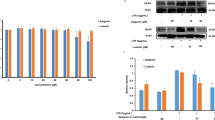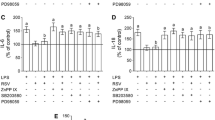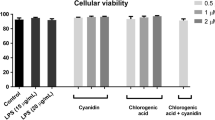We examined the effects of 2.0 μM curcumin, a known antioxidant, on the cultures of normal rat astrocytes and of those subjected to the action of 0.01 μM lipopolysaccharide, LPS. As was found, 24-h-long exposure of astrocytes to LPS resulted in a relatively mild decrease in the cell viability of astrocytes (a decrement of 22%). The action of curcumin significantly ameliorated this decrease. LPS induced significant upregulation of GFAP, NF-κB, and poly(ADP-ribose)polymerase (PARP) in activated astrocytes. Curcumin significantly decreased these effects (to 60, 71, and 89% as compared to those in astrocytes subjected to isolated action of LPS). Thus, curcumin significantly prevents the decrease in cell viability and moderates the cytoskeleton rearrangements and disorders in NF-κBdependent regulation in astrocytes activated by LPS.
Similar content being viewed by others
References
L. F. Eng, R. S. Ghirnikar, and Y. L. Lee, “Glial fibrillary acidic protein: GFAP-thirty-one years (1969-2000),” Neurochem. Res., 9–10, 1439–1451, (2000).
T. Takano, G. F. Tian, W. Peng, et al., “Astrocyte-mediated control of cerebral blood flow,” Nat. Neurosci., 9, No. 2, 260–267, (2006).
L. Ben Haim, M. A. Carrillo-de Sauvage, K. Ceyzériat, et al., “Elusive roles for reactive astrocytes in neurodegenerative diseases,” Front. Cell Neurosci., 9, Art. 278, 1–27, (2015).
L. Tarassishin, H. S. Suh, and S. C. Lee, “LPS and IL-1 differentially activate mouse and human astrocytes: Role of CD14,” Glia, 62, 999–1013, (2014).
A. Daverey and S. K. Agrawal, “Curcumin alleviates oxidative stress and mitochondrial dysfunction in astrocytes,” Neuroscience, 1, No. 333, 92-103, (2016).
M. H. Seyedzadeh, Z. Safari, A. Zare, et al., “Study of curcumin immunomodulatory effects on reactive astrocyte cell function,” Int. Immunopharmacol., No. 1, 230-235, (2014).
H. J. Pimentel-Gutiérrez, L. Bobadilla-Morales, C. C. Barba-Barba, et al., “Curcumin potentiates the effect of chemotherapy against acute lymphoblastic leukemia cells via downregulation of NF-κB,“ Oncol. Lett., No. 5, 41 17-4124, (2016).
T. M. Kauppinen, L. Gan, and R. A. Swanson. “Poly(ADPribose) polymerase-1-induced NAD+ depletion promotes nuclear factor-κB transcriptional activity by preventing p65 de-acetylation,” Biochim. Biophys. Acta, 1833, No. 8, 1985-1991, (2013).
Author information
Authors and Affiliations
Corresponding author
Rights and permissions
About this article
Cite this article
Nedzvetsky, V.S., Agca, C.A. & Kyrychenko, S.V. Neuroprotective Effect of Curcumin on LPS-activated Astrocytes Is Related to the Prevention of GFAP and NF-κB Upregulation. Neurophysiology 49, 305–307 (2017). https://doi.org/10.1007/s11062-017-9687-x
Received:
Published:
Issue Date:
DOI: https://doi.org/10.1007/s11062-017-9687-x




